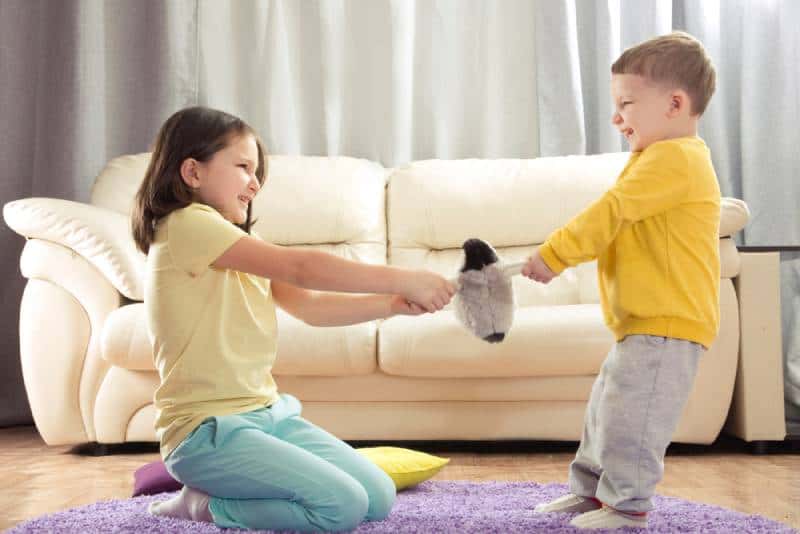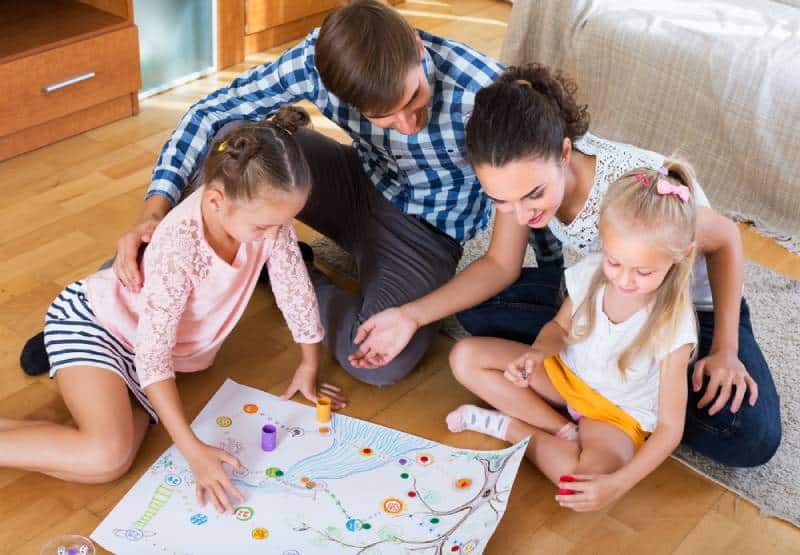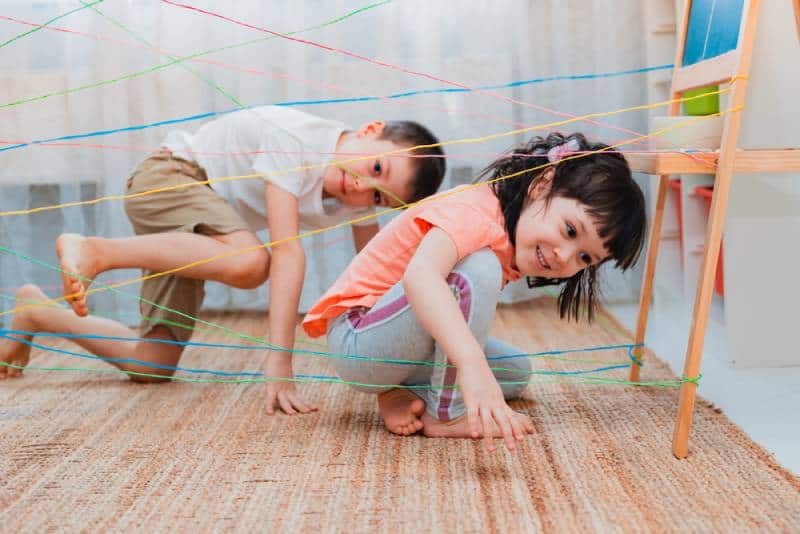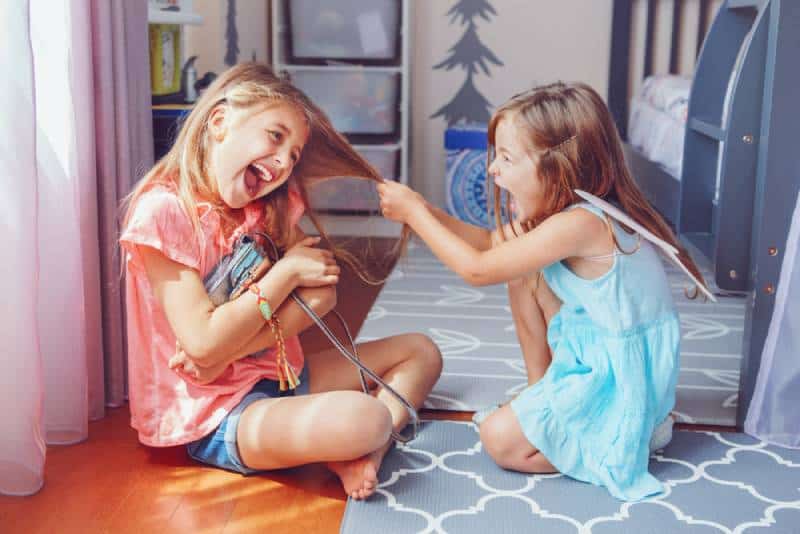When you’ve already had one child for a bit and are now expecting a new baby to come along shortly, it’s only natural for the older child to perhaps show their displeasure at the new arrival in the form of sibling jealousy.
This is a rather common and almost unavoidable consequence of having more than one kid in your family plan.
But, most of these times it tends to not last long, depending on how you handle the situation.
If it’s a recurring problem, then it might be that you’ve been doing something wrong on your end.
Typically, when a new sibling comes into the fold, the older sibling will develop this adversarial attitude toward them.
In their eyes, their younger sibling is stealing their spotlight – the undivided attention they were receiving from both you and your partner is now, well, divided.

This might lead them to acting out.
Your older child – who might have been calm before – will start having tantrums more frequently now that the second child has come on the scene.
From their point of view, they might feel unwanted, which, if left unattended, might grow into deep-seated self-esteem issues, inferiority complexes, and the like.
I doubt any of you intentionally want to make your child feel that way, since I am positive all of you value the mental health of your kids, regardless of their age.
It’s just something that’s very easy to overlook and is never apparent.
Many kids won’t want to express their displeasure in fear of being judged for being jealous in the first place and risk losing even more of the attention they were deprived of when their baby brother or sister came along.
But what can be done about it?
A great deal of things, which I’m here to share – things I’ve pulled from my own experience, and those of other parents that I’ve had the pleasure of talking to about this very topic.
10 Ways Of Handling Sibling Jealousy
1. Identifying the problem preemptively
The simplest and most basic step that should be taken, regardless of whether or not your child is going to develop a big case of sibling jealousy or contempt for the younger child, is to understand that jealousy between siblings is a thing that will most definitely occur.
It’s up to you and your partner to do your job as mommy and daddy, and take some time to ease your firstborn into how their life is going to change once their new sibling arrives.
Give them the time and respect they deserve.
Treat them like they’re adults and not kids, and explain how with the arrival of their little sister or brother they’ll have to share the love you have for both of them.

But, don’t forget to tell them that you’ll still love them regardless, and that this isn’t the end of the world as it might seem for them.
While it may sound cheesy, it will have a positive effect on your child and might be able to stifle some of that negative behavior that comes around with the rise of sibling jealousy (if it even occurs in the first place, that is).
Knowing that they’re still loved is the most important thing for them at this age, even more so than any toy or cartoon, despite it looking otherwise at times.
You can also try and treat them with a big brother gift or a big sister gift and make them feel special about their new role.
2. Observing the problem
Sometimes things that might seem like products of sibling jealousy might be something completely different.
Sometimes that random bout of misbehavior might just be your kid acting out over a different problem, discontent over a different decision of yours, or maybe a bout of hyperactivity – who knows?

This is why it’s important to work on your observational skills and pay attention to what your kids are doing and what triggers these provocations in them, then dealing with them accordingly.
You don’t want to start taking steps for a problem that might not even be there in the first place, only to inadvertently end up creating the very same one.
3. Sharing the love and attention
After that initial talk that you’ve had with your older child, make sure to back it up.
This means that you’re not going to rely on your babysitter or solely on the other parent to be their source of support – you have to be there for them too, mamma.
I know it’ll be a very difficult task to achieve right after the new baby is born, but if you’ve explained everything to your kid previously, it shouldn’t be that big of a problem.
Who knows, they might even be around to help you out, depending on how old they are at the time.

Maintaining and growing the bond you have with your firstborn is still just as important as the one you’ll be creating with your second child.
Don’t let others form that bond for you or you’ll end up regretting it later when you ask yourself why your son or daughter isn’t interested in spending time with you.
Trust me, I’ve seen many friends of mine ask the very same question every time and the simple answer lies in their own past.
4. Learn from your own childhood
History is there to help us learn from our past, fix the mistakes our parents might have made, or repeat the good that they have done for us when we were growing up.
It’s easy to repeat everything that they’ve done in the past, but it’s hard to realize which aspects of that were good and which were bad.
You have to put yourself back in the mind of a child and analyze it with the mind of an adult.
Was the way you were treated the way you’d want your child to be treated by you?

Was a certain way really as unfair as you remember it or was there a deeper meaning to it?
Certainly, it’s no complex philosophy, but you’d be surprised just how many answers you can get from just taking the time to sit down and reflect on your own childhood and compare it to the relationship you have with your parents now.
You might not even need me telling you half of these things because you can extract them from the deep recesses of your mind.
5. Nudge them to form and grow their own sibling bond
It’s not all about your bond with your kids in order to prevent sibling jealousy from escalating into something major.
The bond your kids share with each other also plays a major part in it. It’s a bond that can end up becoming something even stronger than the one you form with either of them.
Naturally it’s nothing to be afraid of – if you’re the one getting jealous of that, then we might be dealing with a whole different issue!
No no, if they start getting along, that’s a lot less trouble for you to deal with – a lot less kids fighting, a lot less injury, and a whole lot of love, support, and stability in your family.
Because this is one of their first bonds, it’s bound to be rocky, especially given any potential underlying animosity between the two.

Even if it’s going well, you should still be around as their mediator to make this bond a rousing success, giving your kids the confidence to form other ones with their future friends and the like.
It might sound weird, but things like these that may seem minor to some people end up carrying quite a lot of relevance in a person’s life, without them even realizing it.
Their sibling will end up being one of their best friends, and the bond they share will be the metric they’ll end up using when gauging how to approach the ones to come on later in their life when their skills develop.
6. Encourage cooperation between the siblings
This one ties into the previous tip, but in a different way, as this one is more relevant when they’re both capable of at least walking, talking, and interacting in a coherent way.
Having them work together on solving a problem, playing a game, or going about a chore is probably the best bonding and team-building experience they could have to strengthen their sibling relationship.

Don’t go around putting them into separate groups. Keep them together if possible during board game night or similar.
Let them rack their brains around a problem when they play against you and your partner or other family members.
Let them try to figure their homework out together.
7. Keep it at sibling rivalry and not sibling jealousy
A bit of competitive spirit is healthy, but make sure it doesn’t get out of control.
Yes, I did mention that you should keep them together most of the time when they do things together, but mixing it up from time to time is healthy, especially in things that give them an even playing field to compete in.

This way they’ll drive each other to improve and grow both as siblings and as individuals overall.
It’ll help build their character and their sense of self, give them confidence when they win, and how to be humble to not ruin the fun of others – alongside teaching them how to spot any potential mistakes they make during said competitions and ways to improve.
8. Include them in as many things as you can
During the initial period when you have to devote a lot of your attention to your newest family member, your older child might start feeling left out regardless.
They are a kid, after all; they tend to have mood swings from time to time.
To combat this, make sure to include them in any activities you might be doing on the side.

No matter how small it may be, it’ll mean the world to them if they feel like they’re contributing to your own work – even if it’s just helping peel some potatoes or fold laundry.
I’d suggest having them assist with the baby, as that will help form that initial bond.
Just watch that it doesn’t backfire in the form of them thinking they’re playing second fiddle to their younger sibling.
9. Make sure to put aside some private time for both of them
Sometimes your kids don’t want to hang around you with the other siblings.
Sometimes they might want to confide in you only, talk to you about something, or simply to spend some 1-on-1 time with you.

So, it’s a good idea to have a set amount of time, even if it’s only half an hour, to devote to each child individually so you too can nurture that separate bond with each of them and show them how much they really mean to you.
This is something that you might not be able to convey properly when the room is crowded, so to speak.
10. If jealousy does occur, don’t emphasize it
If you notice one of your kids showing signs of jealousy, don’t immediately point it out.
Wait until you can get to that private time between you two to discuss and hopefully resolve it. No kid likes being lectured in front of an audience.

Frankly, it will only make them feel rather embarrassed, which won’t lead to any healthy developments, I assure you. Deal with such matters discreetly.
What NOT To Do
While some of these were already glanced over within the initial tips, I do want to put special emphasis on them, as these are probably the worst things one can do to treat sibling jealousy or any other matter concerning your kids to begin with.
1. Don’t let anyone else handle your kids for you
Unless they’re a trained professional – and even then – it’s nobody else’s place to discipline your children or to be their guide, especially during their youth when they’re the most impressionable.
Don’t ignore your children and peddle them off to a nanny or someone else just because you can.

They want the attention of their parents – their mother most of all. Ignoring them will only make matters worse in the long run, when they simply don’t want to listen to you or start outright ignoring you.
Try avoiding this as best you can and you’ll solve most of your problems just by being attentive and responsible.
2. Don’t make them do extracurricular activities that they don’t want to
This ties into the first NO in a sense, but it’s slightly different. If you think the jealousy is a problem and keeping them busy will help resolve this, please stop.
Kids enjoy having the freedom to choose and they should have it in those years, as much as it’s realistically possible (within some boundaries, of course).
If they don’t want to attend ballet, go camping, or learn baseball, then don’t make them.

All you’ll end up doing is making them a big nightmare to deal with when they come back grumpy afterward and miserable in the long run because they’ll feel like they have no say in their own interests.
And these activities aren’t the only things not to push. Signing them up for anything – even so-called behavior classes and the like – they don’t want that.
They want you to teach them that and it is the parent’s role to fulfill in the first place.
3. Don’t treat them differently
This one has a double meaning. The first one is that you should treat them like adults when addressing them, if they’re old enough to understand you properly.
This means no baby talk to appeal to them, no beating around the bush, but being concise and straight to the point when discussing problems or questions that they might have.

The second meaning relates to the siblings themselves. Treat both of them equally, never show any sort of favoritism.
It’s not a healthy outlook on the problem and will never deliver anything good from it.
This means equal punishments for equal mistakes and equal love for equal merits. No discrimination whatsoever.
In Conclusion
Sibling jealousy can be a tricky minefield to navigate and you’re always bound to run into it sooner or later if you plan on having more than one kid. It only gets more intricate the more children you end up having.
Always consider how well you’ll be able to deal with it and consult others before forming your own opinion and delivering your own verdict on the matter at hand.
The most important thing is to love them both unconditionally.
Don’t let anything they do get to you so much that you’ll end up regretting it later.
Despite what they say, they are sensitive, especially at that age, and you have to deliver a certain level of empathy toward them to not hurt them.
I hope this has helped you spot the problem in your kids if there is one, or at least helped you improve on the relationships your kids have with one another, and your own individual relationship between each of them.
Like this post? Please share or pin it for later. You can also stay in the loop and follow us on Facebook, Instagram and Pinterest.

This post contains affiliate links. Please see our full disclosure or more info.

